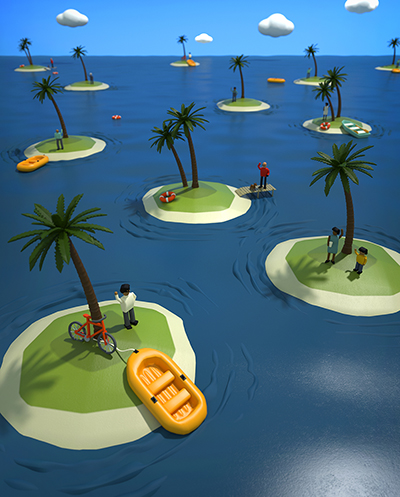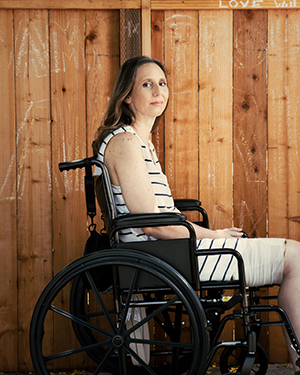Discoveries
Creative Coping: Navigating Cancer During a Pandemic
Nov 11, 2021 Nicole Levine, Illustration by Richard Borge
When a personal health crisis like cancer clashes with a pandemic, an often-isolating disease can become even more confining. Those who endured cancer in 2020 emerged with powerful perspectives that can help anyone face hard times.

In an endless serpentine of cars idling around Dodger Stadium, Marcine Rossen is clutching the wheel of her Volvo hardtop convertible. But she's not headed to a baseball game: For more than two hours she's been waiting to get to the front of the line and receive her first dose of the COVID-19 vaccine.
She jokes that it's a little like being stuck on the 405 freeway, but with no exits in sight.
"The only way out of it was to go through it," she says.
Over the past year, Rossen, 75, has worked her way through a to-do list nobody wants: She started radiation therapy to treat breast cancer within days of the much-awaited shot. Her diagnosis came in July 2020, followed by surgery in August, then chemotherapy and radiation in the following months.
"With cancer and with the pandemic, you just keep putting one foot in front of the other," she says. "You keep moving forward. You hope you can get through it."
COVID-19 rapidly forced changes to everyday life. Simple pleasures like lingering over a steaming latte at a bustling café, laughing with a crowd at a movie and singing along in the electric energy of a live concert disappeared. Jobs went remote or went away, while essential workers masked up and reported for duty.
Hearing that my family is interested and that they care has been so important. It reminds me that I’m so grateful for all I do have.
Marcine Rossen, cancer patient
The pandemic forced everyone to make sometimes challenging changes, says Arash Asher, MD, director of Cancer Rehabilitation and Survivorship at the Samuel Oschin Comprehensive Cancer Institute. Those whose cancer diagnoses collided with a worldwide health crisis faced all those same pressures—on top of chemotherapy, surgeries and a host of other demands. Examining how they endured this time illuminates ways to cope with unexpected and lasting hardships.
"If there's anything we can all take away—not just our patients but all of us—from this traumatic experience, it's some sense of perspective," Asher says. "It thrust a life lesson on us, and a reminder of the things that are important and what our priorities are. We all got a little taste of what cancer patients go through. We had to contend with our mortality and the unknown, facing the fears that come with going through a serious medical circumstance."
The Personal vs. the Pandemic
The pandemic amplified stress and loneliness for everyone, but studies found that cancer patients were particularly impacted. About half of respondents to an American Cancer Society survey reported that the pandemic affected their mental and emotional health.
Cedars-Sinai patients are screened for depression, and during the pandemic those screenings more frequently prompted discussions about coping strategies and referrals to mental health specialists. These trends transformed appointments for patients and their oncologists, says Omid Hamid, MD, director of the Melanoma Program at Cedars-Sinai and chief of Translational Research and Immunotherapy at The Angeles Clinic and Research Institute.
"You can have lots of tunnel vision during a patient visit because of the gravity of the diagnosis you're dealing with," Hamid says. "That's changed. We spend much more time talking about the entirety of their current situation. Not a visit goes on without a nod toward the risk of COVID-19, whether physical, emotional or mental."
The necessities of physical distancing made it harder for cancer patients to seek help, comfort, and support from friends and neighbors. Much of the advice typically offered to cancer patients—like enjoying a weekday movie or brunch when crowds are thinner—became moot, says Jan-Kees van der Gaag, MSW.
It thrust a life lesson on us, and a reminder of the things that are important and what our priorities are. We all got a little taste of what our patients with cancer go through. We had to contend with our mortality and the unknown, facing the fears that come with going through a serious medical circumstance.
Arash Asher, MD

Kaelyn Garvine doesn’t want to be treated with kid gloves because of her melanoma.
"When you're diagnosed with cancer, your world suddenly becomes so small, and part of coping is finding ways to make your world a little bit bigger," says van der Gaag who works as a clinical social work supervisor for the Cedars-Sinai Cancer Patient and Family Support Program. "Cancer can be dehumanizing in many ways. Physical touch and physical presence are very powerful. We lost those with COVID-19."
Kaelyn Garvine, 43, lost her two go-to stress relievers. The pandemic halted her softball activities, an outlet for exercise and bonding with teammates since her teen years. And the melanoma on her foot and leg made her beloved beach walks impossible. In addition to losing those activities, the worry her loved ones expressed over her diagnosis coupled with the threat of COVID-19 became extra obstacles.
"People treat you with kid gloves," she says. "I'm not more likely to catch COVID-19 than anyone else. It is frustrating when everyone thinks they know what's best for you in these difficult times."
Lessons Earned
Rossen learned from her experience at Dodger Stadium that sometimes the only way out of a difficult situation is through it. It wasn't the only wisdom she or other patients earned through 2020 and 2021.
Pete Thompson, 53, overcame melanoma in 2019. When the pandemic struck, he and his wife both started working from their San Diego home while juggling the in-person and online school schedules of their two daughters. During a follow-up appointment at The Angeles Clinic, Hamid discovered that Thompson's cancer had returned.
It's easy to fall into an "emotional rabbit hole," Thompson says. He catches himself worrying about whether he will be at his daughters' weddings or how his wife would struggle as a single mother. Science brings him the solace he needs in those moments.
"Going through this, I've learned so many marvelous drugs are out there for melanoma and new advances are made monthly," he says. "You have to have faith in the science that's going to help you."
For others, making new connections—with humans or animals—brought much-needed relief. When no one could visit her Mar Vista home, Rossen counted on video visits with her 36-year-old nephew, Josh, in Hawaii, often with his 6-year-old daughter. Chatting about his work as a lifeguard offered a window into a life filled with surf, sand and laughter.
"It helps just to be asked how I'm doing," she says. "Just hearing that my family is interested and they care has been so important. It reminds me that I'm so very grateful for all I do have."
In the Blog: What You Need to Know About Melanoma
Garvine joined the thousands who found furry friends during the pandemic—pet adoption soared 15% in 2020, according to Shelter Animals Count, an organization that tracks shelter and rescue activity. She rescued a white pit bull terrier named Brian, whose sweet disposition has made him good company.
"Now instead of asking me about my cancer, my friends ask me what new thing Brian is up to," she says.
Mindfulness, which focuses on staying in the present moment, is a recognized stress reducer. Van der Gaag says patients found it especially useful during the pandemic, often turning to mobile phone apps to help guide their budding mindfulness habits.
"It's normal to ruminate when you're dealing with a crisis," he says. "Often we will look at past actions and try to guess if we could have changed our present if we had done something differently."
These lessons don't just apply to life with cancer: Trust in science, kindness to ourselves, connecting and staying present are all valuable tools for coping through adversity.
"We found that some of our cancer patients coped with the challenges of the pandemic quite well because they had been going through treatment for some time," Asher says. "I think we've all gained important perspective living through the pandemic, and we can carry that forward with us."
Unexpected Gifts
Surviving the pandemic brought its share of hardships but also delivered an opportunity for reexamination, resulting in some potentially lasting benefits. While telemedicine isn't new, COVID-19 was a catalyst for embracing and expanding it.
"You cannot underestimate the value of telemedicine," Hamid says. "Because of the pandemic, we've increased the capacity for patients to be seen, ask follow-up questions and get much of their care without leaving their homes. It also allows patients who live at great distances to obtain consultations and expert opinions on their care more conveniently."
Cedars-Sinai Cancer also opened its support groups to online video platforms, allowing participation from all over the country. The team is working on a hybrid model for the future that welcomes in-person support as well as remote access.
Some experts in infectious disease had been predicting a pandemic would eventually strike. However, few people were braced for how a pandemic of this enormity—claiming more than 4 million worldwide—would change lives.
The magnitude of the shared experience can drastically adjust people's thinking. Asher sees that shift as becoming more centered on service as a way to create meaning.
"As Dr. Viktor Frankl compels us in his seminal work, Man's Search for Meaning, we can look at all the pandemic has taken away and say there's no meaning in this," Asher says. "We could react to the situation without having any sense of responsibility to uplift, improve and contribute. Or we can choose to ask what does life expect of me, and that turns our thought process toward what is meaningful."




